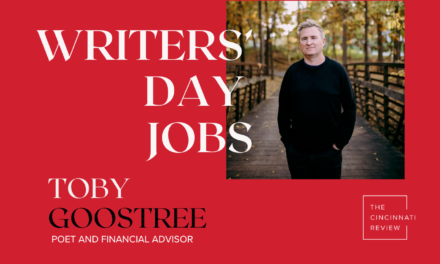Managing Editor Lisa Ampleman: Up next in the Writers’ Day Jobs series is Travis Mossotti, a CR contributor whose poetry appeared in our Issue 7.2 (read his take on the poem here). Travis reached out to me when he saw the series, wanting to share how his job in Information Technology at a university helps support and sustain both his creative life and his family life.
How would you describe what you do for your day job?
I work in IT as the Product Owner for the Research Management System (RMS) at Washington University in St. Louis (managing vended software is the quickest description). In my spare time, I teach in the writing program at Webster University and serve as poet-in-residence at the Endangered Wolf Center.
What do you enjoy about that job, and what are some of its detractions?
I began grant writing and research administration (both of which I enjoyed) before finding my way to the IT side of life, and the system I currently manage handles grant applications for the entire university.
I very much enjoy having that connection to the university’s research arm—it checks off some of the boxes related to life’s little ethical quandaries (i.e., how does what I do for a living contribute to the betterment of the world).
Look, I’m forty-one years old while I’m writing this, and raising children and being mindful of aging parents and looking down the road a bit, so it’s worth mentioning that the money/job security is very, very much appreciated. Career prospects, health care, college tuition for my kiddos, early retirement, and work-life balance are also extremely enjoyable.
As far as detractions? Well, it’s not teaching, and it can feel a bit removed, working firmly outside the bubble of the poetry world forty hours a week (going on six years); it’s kind of liberating though, too—like sobriety or some kind of a first death.
Good with the bad, right? I don’t have the pressure of tenure, but I won’t experience the joy of sabbatical either. I don’t have to read workshop poems or advise students or compose letters of recommendation, but I also don’t get to be part of those wonderful conversations and watch students grow in their work.
One unmistakable joy of my day job happens every day when I close my laptop—that’s it. The work doesn’t invade my subconscious or follow me into my dreamscapes. So when I sit down to write a poem or develop a manuscript, that’s it, too.
My day job has helped me learn to be fully present, and I work hard to hold myself accountable, regardless of the world I’m occupying at any given point in time.
How, if at all, does your day job inform—or relate to—your writing life?
At first glance at this question, I thought I would’ve said it doesn’t—but then I stewed on it a bit and noticed some definite symmetry between my day job and writing life.
My day job is heavy on analysis and collaborative troubleshooting and imagining creative solutions to pressing changes related to the university research community.
There’s room for style, and it’s got this ever-evolving governmental and technical lexicon that’s always gravitating syntactically to a variation on the same question: will this break the system?—which, at its heart, is no different than the question I ask myself (repeatedly) when making choices in a poem.
A successful implementation in the system I manage (any system really) is defined by the invisibility or seamlessness of the implementation—five years of effort should seem, well, effortless.
In many ways, both worlds operate with an extreme amount of attention paid to user or reader experience, acknowledging that even the slightest oversight can bring the whole system or poem crashing to its knees.
What creative projects are you working on right now?
I’m writing poems and shopping manuscripts with the usual mix of luck and humility.
Travis Mossotti‘s latest collection, Narcissus Americana, was selected as the winner of the 2018 Miller Williams Poetry Prize (University of Arkansas Press, 2018).











